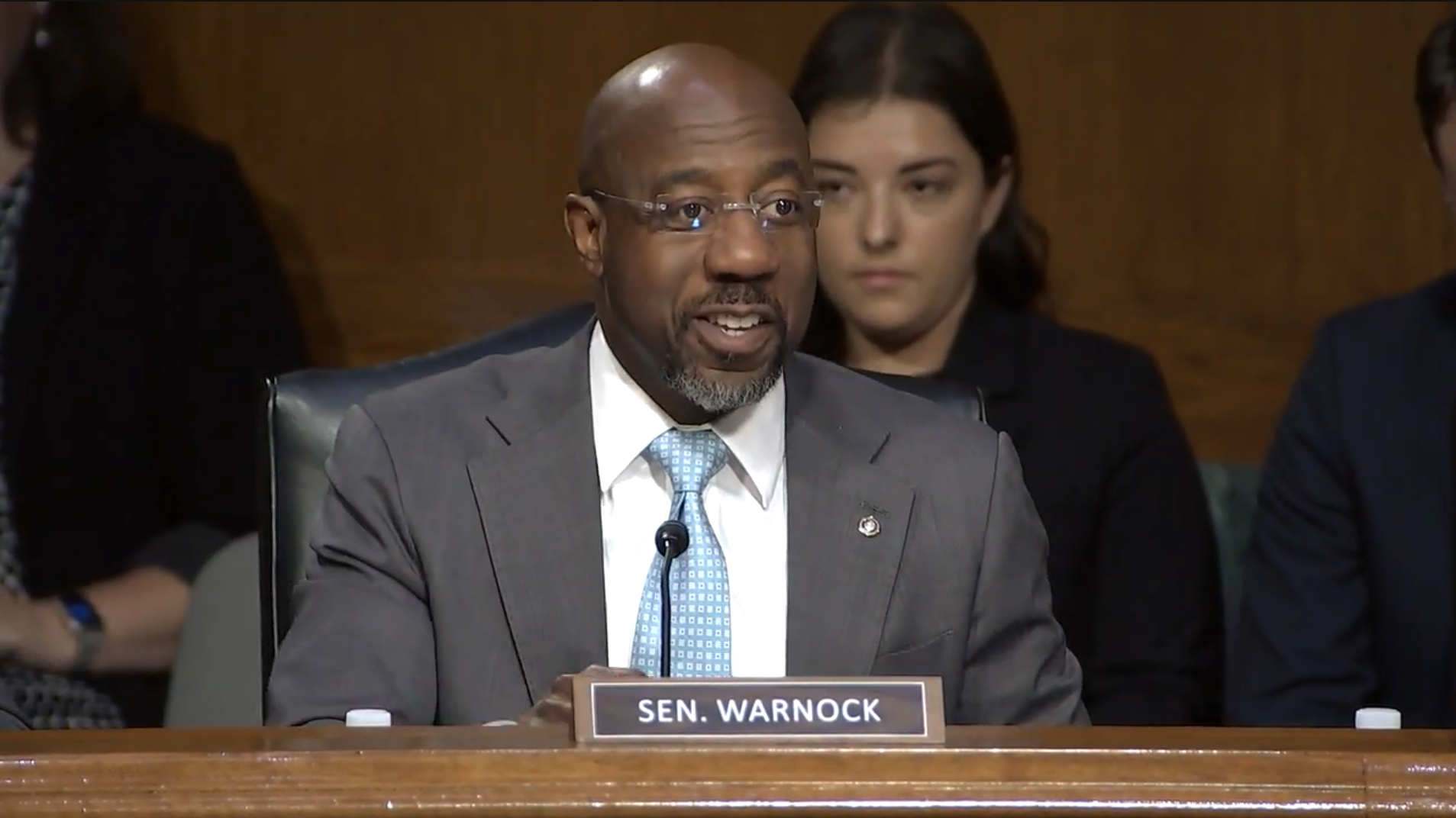Senator Warnock highlighted the effectiveness of federal farm safety net programs during yesterday’s Senate Agriculture Subcommittee on Commodities, Risk Management, and Trade hearing
The “Farm Safety Net” is a collection of programs administered by USDA to provide risk protection and income support to farmers. This support is automatically triggered based on production, weather, and/or market conditions.
Senator Reverend Warnock: “There’s no question that these [cotton] mills are a major economic driver in the state of Georgia. You see it up close in rural towns, like Jefferson and Rabun Gap. And [farm safety net programs are] vital to ensuring that these mills can remain competitive globally, and that they can keep their doors open. And so I hope we can revisit that rate in this year’s farm bill, I certainly will be doing everything I can to see to it that that happens”

WATCH: Senator Reverend Warnock uplifts importance of the farm safety net programs for Georgia peanut and cotton farmers during Senate Agriculture hearing
Washington, D.C. — Yesterday, U.S. Senator Reverend Raphael Warnock (D-GA), a member of the Senate Agriculture Subcommittee on Commodities, Risk Management, and Trade, discussed the effectiveness of the Farm Safety Net with Georgia peanut and cotton farmers. The Farm Safety Net is a collection of programs administered by USDA to provide risk protection and income support to farmers. This support is automatically triggered based on production, weather, and/or market conditions. The Senator is a strong supporter of crop insurance and disaster assistance; he used today’s hearing as an opportunity to uplift the success of these programs. Watch the Senator’s full remarks and questions to the witnesses HERE.
“There’s no question that these [cotton] mills are a major economic driver in the state of Georgia,” said Senator Reverend Warnock.“You see it up close in rural towns, like Jefferson and Rabun Gap. And [farm safety net programs are] vital to ensuring that these mills can remain competitive globally, and that they can keep their doors open. And so I hope we can revisit that rate in this year’s Farm Bill; I certainly will be doing everything I can to see to it that that happens”
Senator Warnock strongly supports USDA’s commodity programs and crop insurance, programs which act as lifelines for Georgia peanut and cotton farmers. Additionally, the Senator also supports increasing insurance for specialty crops.
Watch the Senator’s full remarks and questioning HERE.
See below a transcript of an exchange between Senator Reverend Warnock and panel expert witness Patrick Johnson:
Senator Warnock: “Nationwide, the cotton industry employs over 115,000 people, and it contributes more than $22 billion to the United States economy. Cotton is also a major economic driver in Georgia, with an estimated overall economic impact of $3 billion. The 2008 farm bill originally authorized economic adjustment assistance for textile mills program. Currently, [Economic Adjustment Assistance for Textile Mills] provides three cents per pound of cotton, to domestic cotton mills for capital improvements, like new technology and equipment to help keep them competitive with foreign mills. Mr. Johnson, has this program provided stability in your estimation for the domestic cotton industry? And if so, can you talk about how that’s happened?”
Patrick Johnson, Producer Director, National Cotton Council: “Yes, thank you for that question. We do feel like that’s been a very successful program. If you’ve looked back prior to 2008. The US textile industry struggled for decades. And that has stabilized since that program was instituted in 2008. There’s a great example of the success of that program in your home state, one of the most technologically advanced textile mills in the Americas is in Rabun Gap, Georgia. And the funds that are provided through that program allow mills to update their technology and equipment and make them more efficient. So it’s been very successful. And we would love to see the full payment rate of four cents restored to continue that success.
RW: “Yeah, I’m glad you brought that up. Because it is something as you pointed out to create a stability. Yet we did see that reduction in the 2012 Farm Bill. How do you think restoring that rate to four cents per pound? How would that affect the US cotton industry?”
PJ: “Well, the textile industry is such an important industry for national security. And they also think that just bringing that payment right back up to four cents would allow more efficiency make the US textile industry more competitive. And that’s the goal to it’s great to be able to take the cotton that’s grown here in the US and see it used in manufacturing here.”
RW: “There’s no question that these mills are a major economic driver in the state of Georgia. You see it up close in rural towns, like Jefferson and Rabun Gap. And this program is vital to ensuring that these mills can remain competitive globally, and that they can keep their doors open. And so I hope we can revisit that rate in this year’s farm bill, I certainly will be doing everything I can to see to it that that happens.”
###